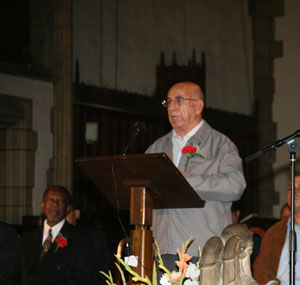

Vol. 72/No. 39 October 6, 2008

|
| Militant/Martín Koppel |
| José Ramón Machado Ventura, first vice president of Cuba, speaks September 22 at Church of the Intercession in New York City. |
Machado Ventura led the highest level Cuban delegation since former president Fidel Castro was here eight years ago.
Earlier in the day Machado Ventura participated in a special UN session on African development, where he demanded that imperialist governments cancel Africa’s foreign debt and grant aid with no strings attached to help overcome the poverty and underdevelopment of the region.
Lucius Walker, director of Pastors for Peace, chaired the meeting at Harlem’s Church of the Intercession. Referring to the UN meeting on Africa, Machado Ventura noted that officials of wealthy governments are now talking about problems like world hunger, the energy crisis, and the environment. “They throw out statistics,” he said, “but they do not issue any real prescriptions that can solve the problems.”
“The countries that have enriched themselves with the plundering” of Africa, Machado Ventura explained, are debating what limits to impose on aid as a way to continue the exploitation of the African continent and the entire planet.
Revolutionary Cuba’s approach is the opposite, he said. Some 33,000 African youth have studied in Cuba on scholarships provided by the revolutionary government over the last 50 years. Close to 2,000 Cuban doctors and health professionals worked in 35 African countries in 2007 alone, providing close to 7 million medical exams, assisting in 100,000 births, and performing 200,000 surgeries.
“We share what we have, not what we have left over,” the Cuban leader said, pointing to what would be possible if instead of squandering resources, the wealthy governments followed Cuba’s example.
“Our speeches are not well received” by the imperialists, Machado Ventura noted, “but the African representatives appreciate them.”
Machado Ventura denounced Washington’s hypocrisy on human rights for carrying out torture at the U.S. military base on Guantánamo, Cuban territory held against the will of the Cuban government and people.
After reiterating Cuba’s solidarity with the Bolivian and Venezuelan governments in the face of U.S. pressure, he expressed support for the Puerto Rican independence struggle saying, “Puerto Rico, its day will come.”
Machado Ventura also talked about how Cuba’s response to hurricanes Gustav and Ike has made an impression around the world. “They ask us how is it possible” that so many people were evacuated and so few died?
“It is possible because of the attention the revolutionary government gives to every citizen of the country,” he said. The strength of the revolution is also seen in “genuine solidarity.” Machado Ventura pointed out that most of the people who were evacuated stayed with neighbors and relatives.
“They were taken in like brothers and sisters because this is rooted in our people; it is how they have been educated by the revolution,” he said.
The imperialists and their allies “are tightening their siege against Cuba because they want to get rid of the example of the Cuban Revolution,” Machado Ventura concluded. But Cuba will keep resisting and increasing the solidarity it offers around the world.
At the opening of the program Rosemary Mealy, a prominent Cuba solidarity activist, introduced attorney Leonard Weinglass, who gave an update on the case of the Cuban Five—Gerardo Hernández, Ramón Labañino, Fernando González, René González, and Antonio Guerrero. They have been imprisoned in the United States for 10 years on charges ranging from “conspiracy to commit espionage” to, in one case, “conspiracy to commit murder.” They were arrested in south Florida in 1998 where they were monitoring the activities of right-wing Cuban groups that have attacked Cuba with Washington’s backing.
Attorneys for the five, including Weinglass, who represents Guerrero, are now appealing the frame-up convictions to the U.S. Supreme Court. He said he expected the court to decide by mid-2009 whether or not to take the case.
There is no guarantee that the Supreme Court will agree to review the convictions. The case “will become important only if there is a national awareness,” Weinglass said, inviting those at the meeting to publicize the frame-up and fight for their release.
Related articles:
Socialist candidate: ‘Lift the embargo on Cuba!’
End the embargo against Cuba!
Government of Cuba mobilizes population in wake of hurricanes
Front page (for this issue) |
Home |
Text-version home